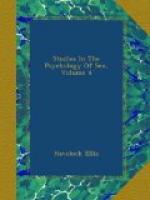passion into aesthetic terms; the actual effect of
the music is not sexual, and it can well be believed
that the results of experiments as regards the sexual
influence of the
Tristan music on men under
the influence of hypnotism have been, as reported,
negative. Helmholtz goes so far as to state that
the expression of sexual longing in music is identical
with that of religious longing. It is quite true,
again, that a soft and gentle voice seems to every
normal man as to Lear “an excellent thing in
woman,” and that a harsh or shrill voice may
seem to deaden or even destroy altogether the attraction
of a beautiful face. But the voice is not usually
in itself an adequate or powerful method of evoking
sexual emotion in a man. Even in its supreme
vocal manifestations the sexual fascination exerted
by a great singer, though certainly considerable,
cannot be compared with that commonly exerted by the
actress. Cases have, indeed, been recorded—chiefly
occurring, it is probable, in men of somewhat morbid
nervous disposition—in which sexual attraction
was exerted chiefly through the ear, or in which there
was a special sexual sensibility to particular inflections
or accents.[120] Fere mentions the case of a young
man in hospital with acute arthritis who complained
of painful erections whenever he heard through the
door the very agreeable voice of the young woman (invisible
to him) who superintended the linen.[121] But these
phenomena do not appear to be common, or, at all events,
very pronounced. So far as my own inquiries go,
only a small proportion of men would appear to experience
definite sexual feelings on listening to music.
And the fact that in woman the voice is so slightly
differentiated from that of the child, as well as
the very significant fact that among man’s immediate
or even remote ancestors the female’s voice can
seldom have served to attract the male, sufficiently
account for the small part played by the voice and
by music as a sexual allurement working on men.[122]
It is otherwise with women. It may, indeed, be
said at the outset that the reasons which make it
antecedently improbable that men should be sexually
attracted through hearing render it probable that women
should be so attracted. The change in the voice
at puberty makes the deeper masculine voice a characteristic
secondary sexual attribute of man, while the fact
that among mammals generally it is the male that is
most vocal—and that chiefly, or even sometimes
exclusively, at the rutting season—renders
it antecedently likely that among mammals generally,
including the human species, there is in the female
an actual or latent susceptibility to the sexual significance
of the male voice,[123] a susceptibility which, under
the conditions of human civilization, may be transferred
to music generally. It is noteworthy that in
novels written by women there is a very frequent attentiveness
to the qualities of the hero’s voice and to
its emotional effects on the heroine.[124] We may also
note the special and peculiar personal enthusiasm
aroused in women by popular musicians, a more pronounced
enthusiasm than is evoked in them by popular actors.




